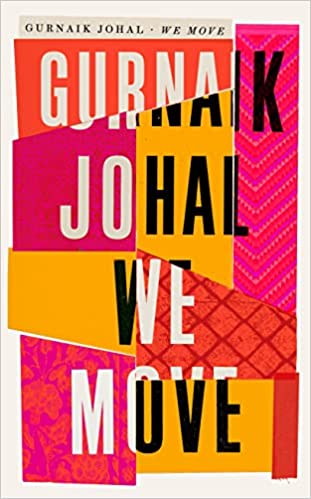We Move by Gurnaik Johal – “short story writing at its finest”

We Move, Gurnaik Johal’s debut short story collection, is set in the London district of Southall, famed for its large South Asian population, especially of Punjabi background. Think Bend it Like Beckham, with hundreds of shops boasting the best Indian food, clothes, jewellery and more. Naturally the narratives centre around various members of the immigrant population and how they have made their lives in England.
Johal’s exploration of his characters’ hidden lives is what is most exciting. He rightly subverts cultural stereotypes and his audience gains a deeper understanding as a result. What dark secrets does the local Indian’s cook have, who you thought was the most straightforward man around? What about his famous chef daughter, or her newly religious sister?
In three cleverly interlinking stories, each titled Chatpata, Johal explores with a keen eye what really occurs beneath the actions of those with otherwise outwardly conventional lives. At the end of the second story, Chatpata: Ahankar, Aman observes her closet gay Dad cooking and ironically wonders, “If only she could have a simple and straightforward a life as him.” Johal sneakily winks at us readers as we know things are not this way.
This is not the only time someone is comparing their life to that of a family member. Take The Red River, which ends with mother, Renu and her son, Karan playing, and her feeling “how happy she was that he could be so loud, that he would never know quietness like she had.”

Johal is interested in the intersection between the lives of different generations in immigrant families and the stark contrast in their experiences. Aman may run a high-end dinery in New York but her parents are former farmers from rural Punjab who struggle with her swanky menu. In the final story, We Move, Lata casually drinks wine and dances with her Mum, Meena, and friends, but when Meena does the same twenty years ago, she is forced into an abusive arranged marriage.
The immersion of many of his stories into the world of British Indians is bold and fruitful. Johal speaks their language, he doesn’t shy away from casual mentions of their backstories and interestingly doesn’t translate words like ‘kuzhambu’, ‘nani’ and ‘apneh’, which had even me, as a first generation Indian, googling definitions. A lesser writer would have done so. It is up to us to find out what these words represent, for in We Move’s Southall setting, these words are used as easily one would say ‘fish and chips’, ‘tea’ or ‘football’.
This acute insight into people’s lives is not found in all the stories however, and that is a significant downfall, for this is what makes We Move. Johal is guilty of writing too much at times and saying too little, and in certain stories like The Piano and Freehold, it seems there is not much beyond the surface.
The most brilliant story in the collection is the first one, Arrival, which won the coveted Galley Beggar Press short story prize in 2021/2022. Arrival is subtle, sweet, and stunningly crafted. In less than five pages, Johal shows how Divya leaving her jilted lover has unexpected consequences for Chetan and Aanshi’s boring, suburban life. They are galvanised into adventurous holidays, cooking exotic meals and trips to IKEA. The decline of Divya’s relationship paralleled with Chetan and Aanshi’s growth is beautifully rendered by Johal, who is expert at exhibiting the tiny quirks and irregularities that those who have been together a long time cherish. Arrival is short story writing at its finest.
Johal in only 23 and has released a strong collection. His next book, a novel, is set in India and is assessing the impact of the mythical river Saraswati on its surrounding population. He has also made a Spotify playlist containing tracks mentioned across the stories. In We Move, you’re given the ingredients to enter Southall and explore. A sentimental, talented and fastidious writer, it will be interesting to see what more Johal has in store for us.
